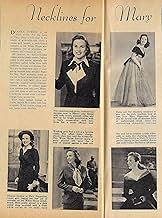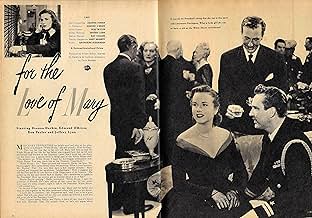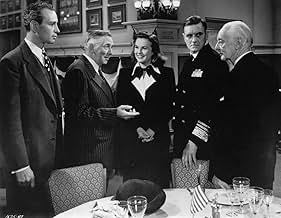NOTE IMDb
6,6/10
452
MA NOTE
Ajouter une intrigue dans votre langueA young girl gets a job at the White House as a switchboard operator and gets mixed up in politics.A young girl gets a job at the White House as a switchboard operator and gets mixed up in politics.A young girl gets a job at the White House as a switchboard operator and gets mixed up in politics.
- Réalisation
- Scénario
- Casting principal
Avis à la une
After seeing one of Deanna Durbin's movies on tv I decided to buy a video and chose this one for a start. As I love music anyways, you can't go wrong with any selection of hers, such a lovely singing voice, she does credit to any song. The story is well acted by each, and it has a quick wit with an interesting twist at the end. Also it's nice to see Harry Davenport in a film I hadn't seen before; he's been a reliable staple in many good movies of that era. It's entertaining and leaves you with a happy feeling after. We need not take life so seriously because after all it can be lighthearted and cheerful too. This film proves it.
Deanna Durbin is an interesting case when it comes to Hollywood stars. While she was among the most popular stars of her day, she retired when she was in her 20s. Why? Apparently she disliked the scripts she was being offered by Universal Studios and instead of making more, she decided to stay home and raise a family. Well, after seeing her final film, "For the Love of Mary", I can certainly understand why she retired...the writing was incredibly convoluted and, need I say, ridiculous. So, despite her charm in the lead, the film is at times a chore to watch.
When the story begins, Mary (Durbin) is going to her new job as a switchboard operator at the White House. It seems that she had been working at the Supreme Court and she was apparently beloved by the Justices...who keep phoning her and keep getting involved in her life. In addition to these guys meddling with her and her love life, the film gets really weird when the President himself starts meddling in her love life! What's next and which of her three suitors, if any, will she choose?
There is MUCH more to the plot than this...a lot more. So much more, in fact, that the story is incredibly complicated and nearly impossible to believe. After all, you'd THINK the President and Supreme Court justices would have a lot more to do than manage Mary's love life! Additionally, the role Durbin plays didn't give her much in the way of broadening her acting abilities and is a lot like her earlier child roles...but with added romance and the usual obligatory songs.
Overall, I didn't hate the film but I really did strongly dislike the writing. It was riddled with impossibilities, silly situations and cliches. As a result, I think Durbin was probably right to change her life radically after making this movie. And, radically she did change it...moving to France, shunning the spotlight and raising a family.
When the story begins, Mary (Durbin) is going to her new job as a switchboard operator at the White House. It seems that she had been working at the Supreme Court and she was apparently beloved by the Justices...who keep phoning her and keep getting involved in her life. In addition to these guys meddling with her and her love life, the film gets really weird when the President himself starts meddling in her love life! What's next and which of her three suitors, if any, will she choose?
There is MUCH more to the plot than this...a lot more. So much more, in fact, that the story is incredibly complicated and nearly impossible to believe. After all, you'd THINK the President and Supreme Court justices would have a lot more to do than manage Mary's love life! Additionally, the role Durbin plays didn't give her much in the way of broadening her acting abilities and is a lot like her earlier child roles...but with added romance and the usual obligatory songs.
Overall, I didn't hate the film but I really did strongly dislike the writing. It was riddled with impossibilities, silly situations and cliches. As a result, I think Durbin was probably right to change her life radically after making this movie. And, radically she did change it...moving to France, shunning the spotlight and raising a family.
This is a charming and surprising comedy well worthy of comparison with films like "My Man Godfrey," "Theodora Goes Wild," and "Ball of Fire." Deanna Durbin is delightful as Mary Peppertree, a former switchboard operator for the U. S. Supreme Court, who quits her job due to a bump in the road of her romance with a young lawyer (Jeffrey Lynn), and moves to a job as a switchboard operator at the White House.
Complications ensue when a goofy but lovable ichthyologist (Don Taylor) keeps calling the switchboard to speak to the President, and Mary gets involved in helping him. However, complexities redouble when she accidentally cuts the President's line in on a call she is taking about her inability to attend the birthday party of her old friend Justice Peabody (Harry Davenport, at his most twinkly judicial self). The president (who is never seen or heard throughout the entire film) tries to help Mary out by assigning her a Navy Lieutenant escort (Edmond O'Brien) to the party.
In short order all three men are courting her, and the President's personal secretary (Ray Collins, best known as Lt. Tragg in "Perry Mason") is enrolled to play cupid at the unseen Chief Executive's command.
Meanwhile a subplot revolves around a jovial immigrant restaurateur from Vienna (Hugo Haas) whom the Supreme Court Justices are coaching so that he can pass his American citizenship test.
The supporting cast is chock full of the best character actors of the 1940s and 1950s, including Louise Beavers ("Imitation of Life," "Beulah") as the cook in Haas's restaurant who fixes up the chopped chicken liver and marinated herring; and Morris Ankrum (a recurrent judge on "Perry Mason") as a Navy Admiral The small-part players work beautifully together as a warm-hearted ensemble cast.
Not only is this a romantic comedy, it is also a musical, with Deanna Durbin in fine voice and, for a couple of numbers. Accompanied by the assembled justices of the Supreme Court, who sing old, sweet songs in quartet harmony while Harry Davenport accompanies them on accordion.
The best musical number of all, however is Durbin's soprano rendition of "Largo al factotum" (a.k.a. "Figaro") from Rossini's opera "The Barber of Seville" -- what a surprise! -- and just as surprising is how well it fits into the storyline, because like "The Barber of Seville," this is a comedy of missed connections and thwarted romance, in which those with access to the powerful can pull the strings to make everything come out exactly right in the end.
I loved this movie and am only sad that it took me until i was 76 years old to see it!
Complications ensue when a goofy but lovable ichthyologist (Don Taylor) keeps calling the switchboard to speak to the President, and Mary gets involved in helping him. However, complexities redouble when she accidentally cuts the President's line in on a call she is taking about her inability to attend the birthday party of her old friend Justice Peabody (Harry Davenport, at his most twinkly judicial self). The president (who is never seen or heard throughout the entire film) tries to help Mary out by assigning her a Navy Lieutenant escort (Edmond O'Brien) to the party.
In short order all three men are courting her, and the President's personal secretary (Ray Collins, best known as Lt. Tragg in "Perry Mason") is enrolled to play cupid at the unseen Chief Executive's command.
Meanwhile a subplot revolves around a jovial immigrant restaurateur from Vienna (Hugo Haas) whom the Supreme Court Justices are coaching so that he can pass his American citizenship test.
The supporting cast is chock full of the best character actors of the 1940s and 1950s, including Louise Beavers ("Imitation of Life," "Beulah") as the cook in Haas's restaurant who fixes up the chopped chicken liver and marinated herring; and Morris Ankrum (a recurrent judge on "Perry Mason") as a Navy Admiral The small-part players work beautifully together as a warm-hearted ensemble cast.
Not only is this a romantic comedy, it is also a musical, with Deanna Durbin in fine voice and, for a couple of numbers. Accompanied by the assembled justices of the Supreme Court, who sing old, sweet songs in quartet harmony while Harry Davenport accompanies them on accordion.
The best musical number of all, however is Durbin's soprano rendition of "Largo al factotum" (a.k.a. "Figaro") from Rossini's opera "The Barber of Seville" -- what a surprise! -- and just as surprising is how well it fits into the storyline, because like "The Barber of Seville," this is a comedy of missed connections and thwarted romance, in which those with access to the powerful can pull the strings to make everything come out exactly right in the end.
I loved this movie and am only sad that it took me until i was 76 years old to see it!
When Washington insider Deanna Durbin gets a job on the White House switchboard, her friends, which includes senator Ray Collins and four or five Supreme Court justices, try to arrange her life for her. Young men cluster around her, too, including Navy lieutenant Edmond O'Brien, lawyer Jeffrey Lynn, and marine biologist Don Taylor.
Miss Durbin sings 'largo al factotum', and 'On Moonlight Bay'. And as she so often does, shows a real emotional connection with an unlikely elderly man or two. The story itself is nonsense. This may seem like a standard complaint for Miss Durbin's vehicles, but individual plot points are rushed over so you don't notice.
This movie, as well as Miss Durbin's previous few, had not performed well at the box office. Her star persona was Little Miss Fix-it, and she was no longer age-appropriate for it. Tired of the Hollywood grind, she left Hollywood a year later. Despite pleas from producers ranging from Joe Pasternak at MGM to Lerner & Lowe for MY FAIR LADY. She turned them all down, and only gave one interview in the remaining 65 years of her life. She died in 2013 at the age of 91, just where she wanted to be: out of the public's eye.
Miss Durbin sings 'largo al factotum', and 'On Moonlight Bay'. And as she so often does, shows a real emotional connection with an unlikely elderly man or two. The story itself is nonsense. This may seem like a standard complaint for Miss Durbin's vehicles, but individual plot points are rushed over so you don't notice.
This movie, as well as Miss Durbin's previous few, had not performed well at the box office. Her star persona was Little Miss Fix-it, and she was no longer age-appropriate for it. Tired of the Hollywood grind, she left Hollywood a year later. Despite pleas from producers ranging from Joe Pasternak at MGM to Lerner & Lowe for MY FAIR LADY. She turned them all down, and only gave one interview in the remaining 65 years of her life. She died in 2013 at the age of 91, just where she wanted to be: out of the public's eye.
This is one of the last of Deanna Durbin's movies, and as I knew that by this time she was on the point of leaving the film industry I hesitated to watch it: I just did not expect much, as I assumed it would be evident that Durbin was at this point pretty much fed up with acting. What a mistake. This an intelligent comedy with a surprising ending and a very good cast. Durbin in particular is in top form; her comic timing is impeccable. For me, the high point is her rendition of a piece from the Barber of Seville that is intended for a baritone. She sings this with great good humour (and with a moustache) - it is an absolute lark; you are just left smiling and wishing it would go on. It is an eternal pity that Durbin stopped making films. Had she been around in the 1950s and -60s, Doris Day (almost exactly her age) would have had a much harder time establishing herself as the leading singing comedienne.
Le saviez-vous
- AnecdotesThis was the last film appearance of Deanna Durbin. On August 22, 1948, two months after the picture wrapped, Universal-International announced a lawsuit brought against Miss Durbin for the sum of $87,083 in wages advanced to her. The actress settled the dispute by agreeing to stay on with the studio for an additional three pictures (including a project intended to be shot in Paris). Instead, Universal-International simply permitted Deanna's contract to expire on August 31, 1949. Upon leaving the studio after 13 years and 21 features, Deanna was paid $150,000 for the three abandoned films plus another $50,000 owed her for this movie. Miss Durbin then retired from all of show business. In subsequent years, producer Joe Pasternak, Deanna's early mentor at Universal, could not persuade Miss Durbin to resume her film career at MGM, and she would reject two prime female leads offered by the studio: in the Jack Cummings production of Cole Porter's Embrasse-moi, chérie (1953), and in the Pasternak filming of Sigmund Romberg's Le prince étudiant (1954).
- GaffesIn the kitchen at Gustav's, Mary is wearing earrings in some shots, but not in others.
- Citations
David Paxton: "Young lady," said the mysterious diner, "do you know the meaning of the word bumbledon? Bumbledon is the pomposity of petty officials, little people in little jobs, who think the world will stop turning without them."
- Bandes originalesOn the Wings of a Song
(uncredited)
Music by Felix Mendelssohn
Adaptation by Edgar Fairchild
Lyrics by Sidney Miller
Sung by Deanna Durbin
Meilleurs choix
Connectez-vous pour évaluer et suivre la liste de favoris afin de recevoir des recommandations personnalisées
Détails
- Date de sortie
- Pays d’origine
- Langue
- Aussi connu sous le nom de
- For the Love of Mary
- Lieux de tournage
- Société de production
- Voir plus de crédits d'entreprise sur IMDbPro
- Durée
- 1h 30min(90 min)
- Couleur
- Rapport de forme
- 1.37 : 1
Contribuer à cette page
Suggérer une modification ou ajouter du contenu manquant































